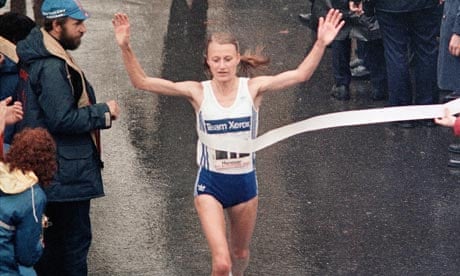Grete Waitz, who has died aged 57, achieved an iconic status in women's distance running, winning the World Marathon title in 1983, the New York Marathon nine times, the London Marathon twice, and the World Cross Country Championship on five occasions.
But the sum of those achievements, substantial though they are, is only part of the story. Women's distance running was an embryonic sport in the late 1970s; Waitz changed that. Without fanfare (the Norwegian was a self-effacing, private person) she inspired women at all levels of ability to become runners. "She was the first world-class distance runner and she opened the doors for everyone. If it wasn't for Grete, women's distance running would not be where it is now," said Liz McColgan, herself a winner of the New York and London marathons, and who, from 1992, was coached by Waitz.
Ironically, prior to her first marathon in 1978, Waitz had flirted with retirement. At that stage her achievements would already have satisfied many an athlete, with bronze medals in two European championships, and two 3,000m world records to her name.
The youngest of three sporting siblings brought up in an Oslo suburb, Grete Andersen progressed swiftly as a young athlete, a fact she attributed to the competition for attention with her two elder brothers, Arild and Jan. At 17, she broke the European junior 1500m record and a year later made the Norwegian team for the Munich Games. Her Olympics ended early, though, when she was eliminated in the heats of the 1500m. But two years later at the European championships in Rome in 1974, she won her first senior championship medal, finishing third in the same event.
In the early days of her running career, she also worked as a PE teacher in Oslo. In 1975, Andersen married Jack Nilsen, and they settled on his mother's name, Waitz, as their married name. Thereafter, he would be her coach and ever-present.
With the 1500m still the longest Olympic event, there was disappointment again for Waitz in the 1976 Games, but once again compensation came in the European championships; another bronze forthcoming in 1978, this time in the 3,000m.
That year, there were just seven weeks between the end of the European championships and the New York Marathon, but Jack persuaded her that she should run it. The New York race director, Fred Lebow, needed some persuading too. Not expecting Waitz, who had never even raced a half-marathon, to last the distance, he eventually conscripted her to run as a pacemaker.
Wearing number 1173F, which was a measure of her anonymity (the best athletes get the lowest numbers) Waitz won in a new world record of two hours 32 minutes and 30 seconds. "When I crossed the line I was furious with Jack because my whole body hurt. But once the anger had gone and the pain had lessened and the victory soaked in, I realised that it was a milestone in my career," she said later.
Waitz returned to New York for nine of the next 10 years and only once, through injury, failed to win. In 1983, her perfect year, she won the London Marathon in a world record (albeit it was beaten in Boston a day later by the American Joan Benoit); won the World Marathon title in the inaugural championships in Helsinki; and followed that with her fifth New York victory.
Victory in the Los Angeles Games in 1984 in the first-ever women's Olympic marathon would have crowned a remarkable career, but Benoit was the stumbling block, the American bouncing into the stadium over a minute ahead of her. Waitz never ran in the Olympics again; it was the one prize to elude her.
There would follow three more New York victories and a return success in London in 1986 before she retired from serious racing in 1991. Then there was a final marathon, more poignant than any, when in 1992 she accompanied Lebow, founder of the New York Marathon, on his last hurrah. Lebow had been diagnosed with a brain tumour in 1990 and together they completed the race in just over five and a half hours.
Waitz herself was diagnosed with cancer in 2005. Through the chemotherapy, she continued on her treadmill, walking not running. "The illness changed her. She became more outgoing," said Svein Arne Hansen, president of the Norwegian Athletics Federation.
In her last years, Waitz worked tirelessly for the Norwegian cancer charity Aktiv Mot Kreft (Active Against Cancer). She is survived by Jack and her brothers Arild and Jan.
